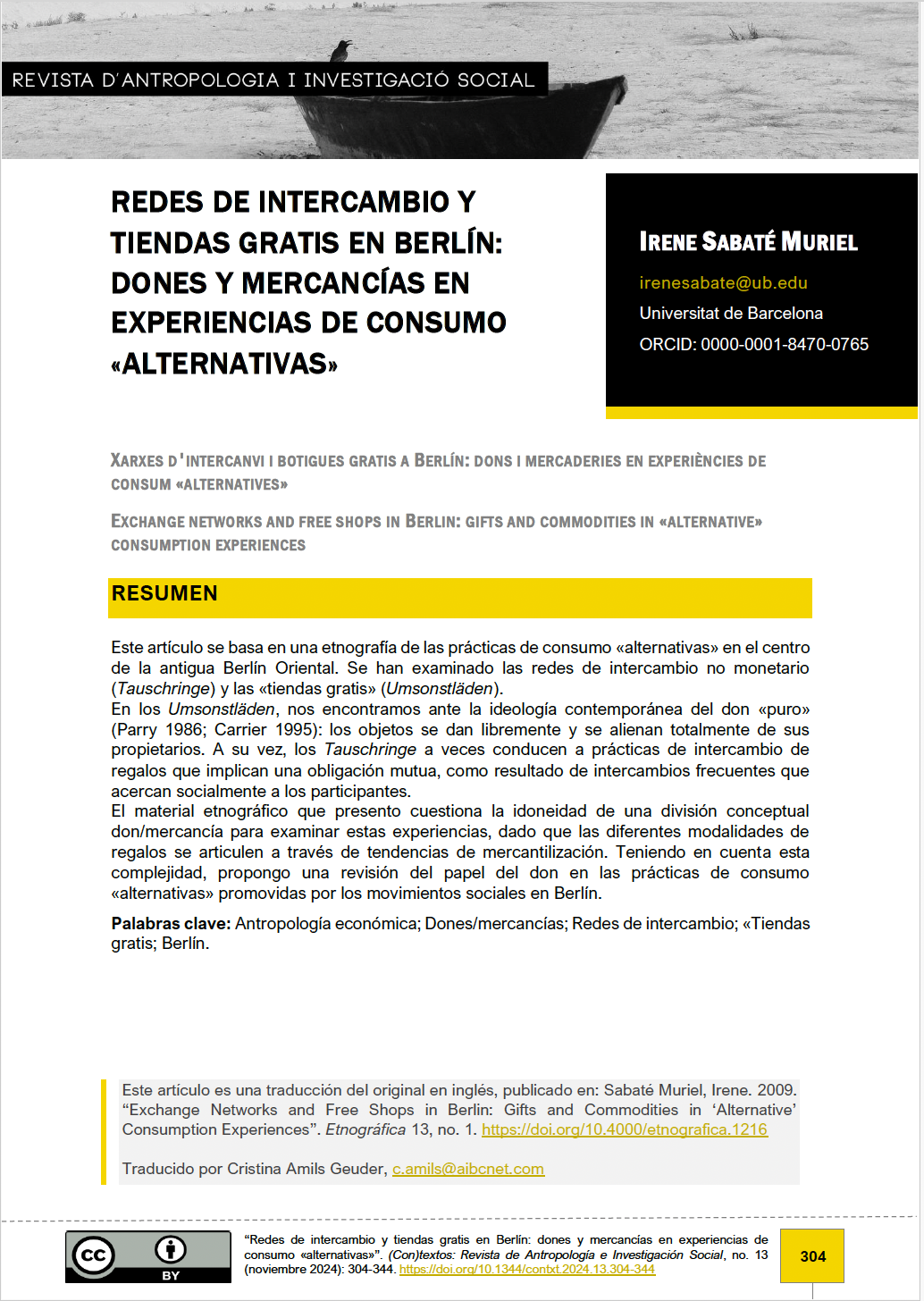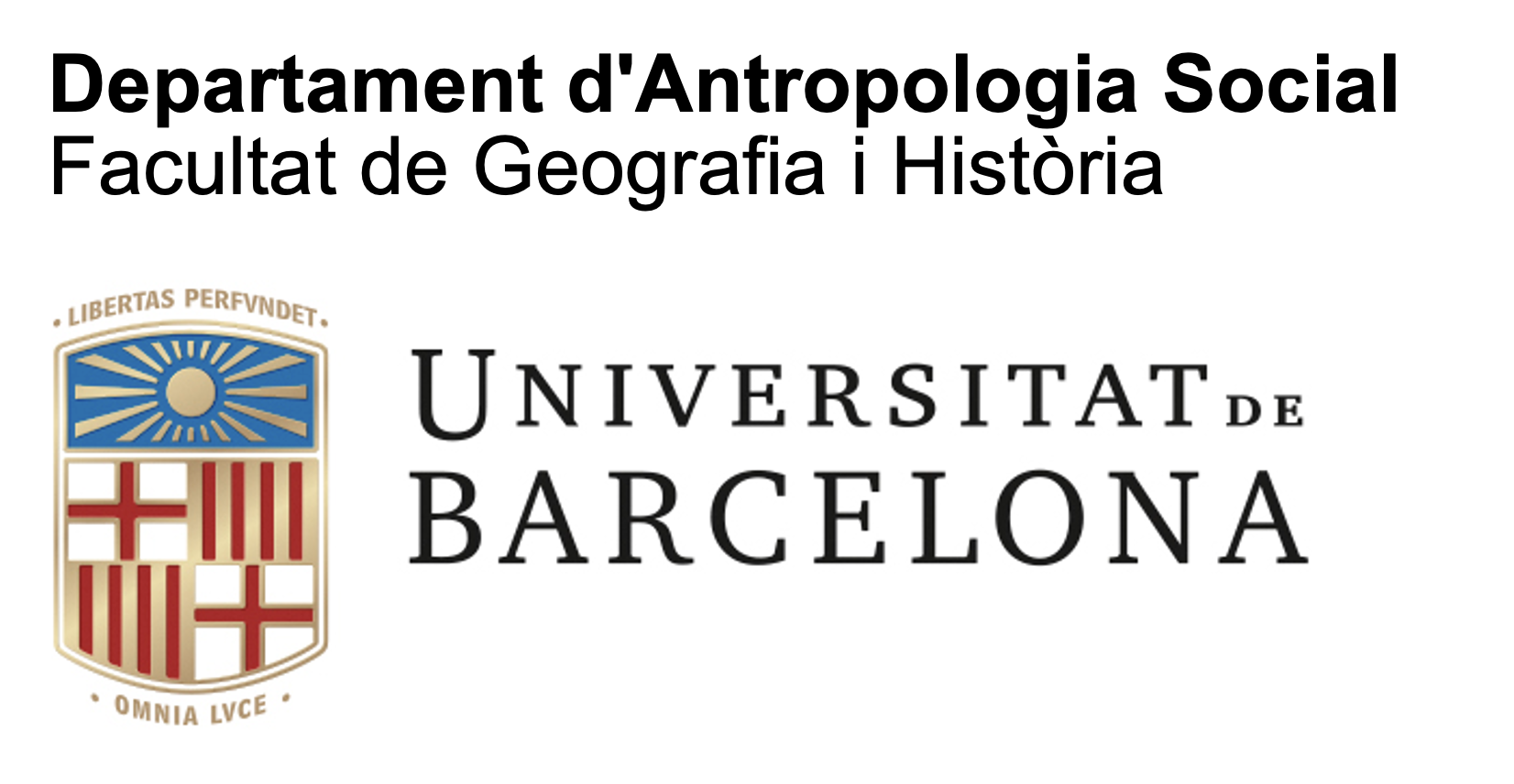Exchange networks and free shops in Berlin: gifts and commodities in ‘alternative’ consumption experiences
DOI:
https://doi.org/10.1344/contxt.2024.13.304-344Keywords:
economic anthropology, gifts/commodities, exchange networks, free shops, BerlinAbstract
This paper is based on an ethnography of ‘alternative’ consumption practices in the inner city of the former East Berlin. Non-monetary exchange networks (Tauschringe) and ‘free shops’ (Umsonstläden) have been examined.
In Umsonstläden, the contemporary ideology of the ‘pure’ gift (Parry 1986; Carrier 1995) is at play: objects are freely given and totally alienated from their owners. In turn, Tauschringe sometimes induce gift-giving practices entailing mutual obligation, as a result of frequent exchanges which bring participants socially closer.
The ethnographic material I present challenges the suitability of a conceptual gift/commodity divide to examine these experiences, provided that different modalities of gift-giving are articulated with commoditisation trends. Considering this complexity, I propose a re-examination of the role of the gift in ‘alternative’ consumption practices promoted by social movements in Berlin.
Downloads
References
Appadurai, Arjun, ed. 1986. The Social Life of Things. Cambridge: Cambridge University Press.
Appadurai, Arjun. 1986. “Introduction: Commodities and the Politics of Value”. En The Social Life of Things, editado por Arjun Appadurai, 3-63. Cambridge: Cambridge University Press.
Berdahl, Daphne. 1997. Where the World Ended: Re-unification and Identity in the German Borderland. Berkeley: University of California Press.
Bohannan, Paul. 1981. “El impacto de la moneda en una economía africana de subsistencia”. En Antropología económica, editado por José R. Llobera, 157-183. Barcelona: Anagrama.
Bourdieu, Pierre. 1980. “Le Capital Social. Notes Provisoires”. Actes de la Recherche en Sciences Sociales 31: 2-3.
Bowring, Finn. 1998. “LETS: An Eco-socialist Initiative?” New Left Review 232: 91-111.
Brandon, Peter D. 2000. “An Analysis of Kin-Provided Child Care in the Context of Intrafamily Exchanges”. American Journal of Economics and Sociology 59 (2): 191-216.
Carrier, James. 1995. Gifts and Commodities: Exchange and Western Capitalism since 1700. Londres: Routledge.
Crewe, Louise y Nicky Gregson. 1998. “Tales of the Unexpected: Exploring Car Boot Sales as Marginal Spaces of Contemporary Consumption”. Transactions of the Institute of British Geographers 23 (1): 39-53.
Davis, John. 1973. “The Particular Theory of Exchange”. European Journal of Sociology 16: 151-168.
Dunn, Elizabeth. 1999. “Slick Salesmen and Simple People: Negotiated Capitalism in a Privatized Polish Firm”. En Uncertain Transition: Ethnographies of Change in the Postsocialist World, editado por Michael Burawoy y Katherine Verdery, 125-147. Lanham (Maryland): Rowman & Littlefield Publishers.
Friedrichshainer Tauschring. 2005. Folleto. Berlín: Friedrichshainer Tauschring.
Gerometta, Julia. 1999. Möglichkeiten und Grenzen von Tauschringen in Grossstädten: Das Beispiel Berlin Friedrichshain. Diplomarbeit, Freie Universität Berlin.
Godelier, Maurice. 2004. “Acerca de las cosas que se dan, de las cosas que se venden y de las que no hay que vender ni dar sino que hay que guardar. Una reevaluación crítica del ensayo sobre el don de Marcel Mauss”. En Entre las gracias y el molino satánico: Lecturas de Antropología económica, editado por Paz Moreno, 19-51. Madrid: UNED.
Gregory, Chris A. 1982. Gifts and Commodities. Londres: Academic Press.
______. 1997. Savage Money: The Anthropology and Politics of Commodity Exchange. Amsterdam: Harwood Academic Publishers.
Grünert, Ch. 1999. “Tauschringe: eine effiziente Alternative zum klassischen Markt?” http://www.tauschring-archiv.de/TR-Archiv/HistorieTS/historie.html (consultado el 29 de marzo de 2008).
Gudeman, Stephen. 2001. The Anthropology of Economy: Community, Market, and Culture. Oxford: Blackwell Publishers.
Herrmann, Gretchen M. 1997. “Gift or Commodity: What Changes Hands in the U.S. Garage Sale?” American Ethnologist 24 (4): 910-930.
Herrmann, Jens. 2005. “Utopia Meets Reality: Grenzerfahrungen in der anderen Wirtschaft”. Hefte zu Widerstand und Vision, Nullnummer. Stiftung FreiRäume.
Humphrey, Caroline. 2002. The Unmaking of Soviet Life: Everyday Economics after Socialism. Londres: Cornell University Press.
Info-pack Kreuzberger. s.f. Folleto. Berlín: Kreuzberger Tauschring.
Joly, Nathalie y Jean-Pierre Sylvestre. 2004. “Logiques d'échange et formes de sociabilité: Les réseaux d'échanges réciproques de savoirs”. En Économies choisies? Échanges, circulations et débrouille, editado por Noël Barbe y Serge Latouche, 145-167. París: Éditions de la Maison des Sciences de l'Homme.
Kopytoff, Igor. 1986. “The Cultural Biography of Things: Commoditization as Process”. En The Social Life of Things, editado por Arjun Appadurai, 64-91. Cambridge: Cambridge University Press.
Laacher, Smaïn. 2004. “Une économie choisie: L'exemple des systèmes d'échanges locaux”. En Économies choisies? Échanges, circulations et débrouille, editado por Noël Barbe y Serge Latouche, 89-114. París: Éditions de la Maison des Sciences de l'Homme.
Laidlaw, James. 2000. “A Free Gift Makes No Friends”. Journal of the Royal Anthropological Institute 6: 617-634.
Lauraire, Richard. 2004. “Vers des organisations dualistes? Les systèmes d'échanges locaux”. En Économies choisies? Échanges, circulations et débrouille, editado por Noël Barbe y Serge Latouche, 189-212. París: Éditions de la Maison des Sciences de l'Homme.
Lomnitz, Larisa. 1975. Cómo sobreviven los marginados. México: Siglo XXI.
“Long live the free-shop”. Folleto. Berlín, sin fecha.
Malinowski, Bronislaw. 2001 [1922]. Los argonautas del Pacífico Occidental. Barcelona: Península.
Mauss, Marcel. 1979 [1923-24]. “Ensayo sobre los dones: Razón y forma del cambio en las sociedades primitivas”. En Sociología y antropología, 119-219. Madrid: Tecnos.
Netzwerk Gratisökonomie. 2005. “Bye-bye capitalism”. Hefte zu Widerstand und Vision, Nullnummer. Stiftung FreiRäume.
Norte, Peter. 2002. “LETS in a Cold Climate: Green Dollars, Self-Help and Neoliberal Welfare in New Zealand”. Policy and Politics 30 (4): 483-499.
Parry, Jonathan. 1986. “The Gift, the Indian Gift and the 'Indian Gift'”. Man 21 (3): 453-473.
Parry, Jonathan y Maurice Bloch, eds. 1989. Money and the Morality of Exchange. Cambridge: Cambridge University Press.
Patico, Jennifer. 2002. “Chocolate and Cognac: Gifts and the Recognition of Social Worlds in Post-Soviet Russia”. Ethnos 67 (3): 345-368.
Pierret, Dorothee. 1999. “Cercles d'échanges, cercles vertueux de la solidarité: Le cas de l'Allemagne”. International Journal of Community Currency Research 3.
Pila, Carol. 1974. All our Kin: Strategies for Survival in a Black Community. Nueva York: Harper & Row.
Polanyi, Karl. 1994 [1977]. El sustento del hombre. Barcelona: Mondadori.
______. 2001 [1944]. The Great Transformation: The Political and Economic Origins of Our Time. Boston: Beacon Press.
Sabaté, Irene. 2006. ¿Al margen del mercado? Consumos heterodoxos en la Innenstadt de Berlín Este. Tesis de máster, Universidad de Barcelona.
______. 2008. “El trabajo de habitar. Rehabilitación autogestionada y habitación comunitaria en Berlín”. Arquivos da Memória 3: 58-91. ISSN: 0874-1123. Disponible online: https://dialnet.unirioja.es/descarga/articulo/2723445.pdf
Sahlins, Marshall. 1983 [1974]. Economía de la Edad de Piedra. Madrid: Akal.
Schröder, Rolf F.H. 2004. “'Non-Profit' Tauschsysteme: Ein Literaturüberblick”. Documento de trabajo (versión 8/2004). http://129.3.20.41/eps/meet/papers/0311/0311001.pdf.
______. 2006. “Community Exchange and Trading Systems in Germany”. International Journal of Community Currency Research 10: 24-42.
Straßenkreuzer. 2004. Revista del Kreuzberger Tauschring, abril.
Supiot, Alain. 2000. “The Dogmatic Foundations of the Market”. Industrial Law Journal 29 (4): 321-345.
Thomas, Nicholas. 1991. Entangled Objects: Exchange, Material Culture and Colonialism in the Pacific. Cambridge: Harvard University Press.
Weiner, Annette. 1992. Inalienable Possessions: The Paradox of Keeping-While-Giving. Berkeley: University of California Press.

Downloads
Published
How to Cite
Issue
Section
License
Copyright (c) 2024 Irene Sabaté Muriel

This work is licensed under a Creative Commons Attribution 4.0 International License.
The authors who publish in this journal agree to the following terms:
The author retains the authorship rights, and grants (Con)textos: revista d'antropologia i investigació social the rights to the first publication of the article.
The author authorizes the reproduction and dissemination of their articles in indexing and abstract services, academic databases and repositories in which the journal currently or in the future participates. After No 13, texts will be disseminated with the Creative Commons - Attribution (CC-by) license as long as the author and the journal are acknowledged.
Likewise, the authors can deposit the final version accepted for publication in institutional or thematic open access repositories. (Con)textos: revista d'antropologia i investigació social does not accept any responsibility for the views and statements made by the authors in their works.






